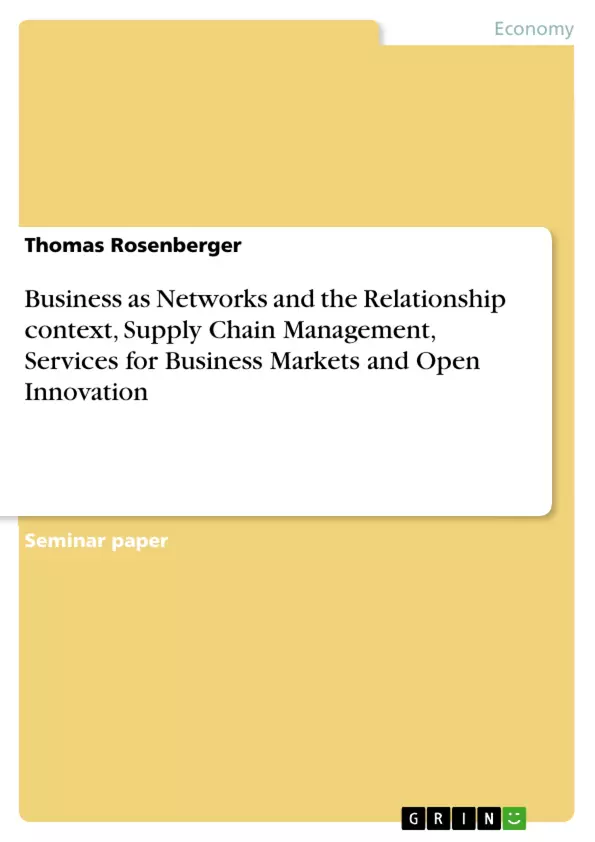This paper deals with Business as Networks and the Relationship context, Supply Chain Management, Services for Business Markets and Open Innovation. Furthermore questions about B2B branding, dealing with difficult relationships and the role of small companies in supply chains are addressed in more detail. The B2B Market has a highly bigger volume as the B2C Market. Despite of that (pure) B2B brands (however a few strong B2B brands which are also active in the B2C segment are exist) are not that well known as B2C brands. This raises the question if B2B branding is as important as B2C branding and which value does business relationships have related to brand value?
Business markets (B2B) and consumer markets (B2C) need to be distinguished. The B2B market has its own characteristics and is distinctly marked with the biggest market share. Consequently it refers to that the volume of sales greatly exceeds the B2C market and a strong customer concentration. Consider that for every B2C transactions are a couple of B2B transactions are running before. Companies can serve both markets like Dell (hybrid strategy), pure B2B servers like the Schäffler Group (automotive supplier), or pure B2C servers like H&M. Categories of customer are governmental bodies, private companies and institutions.
Inhaltsverzeichnis (Table of Contents)
- Introduction.
- Short differentiation of B2B B2C markets and the B2B branding question
- Relationships within a network and the importance of trust and commitment
- Supply Chain Management and the role of SME in a SC
- Services in business markets s – a new logic, benefits and challenges.……………………...\n
- New era of upcoming open innovation
Zielsetzung und Themenschwerpunkte (Objectives and Key Themes)
This learning diary explores key aspects of Business Marketing, focusing on the relationship context, supply chain management, services in business markets, and open innovation. The diary examines the specific challenges and opportunities that arise within B2B contexts, particularly the importance of building strong relationships, managing complex supply chains, and adapting to the evolving landscape of open innovation.
- Distinguishing B2B and B2C markets
- The role and significance of branding in B2B
- The importance of trust and commitment in business networks
- Supply chain management and the role of SMEs
- The evolving nature of services in business markets
Zusammenfassung der Kapitel (Chapter Summaries)
- Introduction: This chapter sets the stage for the learning diary, outlining its focus on the Business Marketing course and the four seminar topics: Business as Networks and the Relationship context, Supply Chain Management, Services for Business Markets, and Open Innovation. The chapter also highlights key questions surrounding B2B branding, managing difficult relationships, and the role of SMEs in supply chains.
- Short differentiation of B2B / B2C markets and the B2B branding question: This chapter explores the differences between B2B and B2C markets, highlighting the unique characteristics and volume of the B2B market. The discussion then delves into the importance of B2B branding and its role in building relationships and creating value. The chapter emphasizes the need for B2B brands to act as ambassadors in the globalized economy and addresses the misconception that branding is a waste of money in the B2B context.
- Relationships within a network and the importance of trust and commitment: This chapter underscores the significance of relationship management in the B2B context. The chapter discusses the concept of business networks and emphasizes the key role of trust and commitment in fostering successful relationships and competitive advantage within these networks. The chapter also introduces the network model, which depicts the interplay of actors, activities, and resources within a business network.
Schlüsselwörter (Keywords)
This learning diary explores key concepts in business marketing, including B2B branding, relationship management, trust, commitment, supply chain management, open innovation, and the role of SMEs in business networks. The diary examines the challenges and opportunities presented by the evolving landscape of business markets, particularly the need to build strong relationships, manage complex supply chains, and adapt to the increasing influence of open innovation strategies.
Frequently Asked Questions
What are the main differences between B2B and B2C markets?
B2B (Business-to-Business) markets typically involve higher sales volumes, professional buyers, and a higher concentration of customers compared to B2C (Business-to-Consumer) markets. B2B transactions often occur multiple times before a single B2C transaction takes place.
Is branding important in the B2B sector?
Yes, branding is crucial in B2B as it acts as an ambassador in a globalized economy. It helps build trust, differentiates companies from competitors, and creates long-term value in business relationships.
What role do trust and commitment play in business networks?
Trust and commitment are the foundations of successful business relationships. They foster cooperation, reduce perceived risk, and provide a competitive advantage within complex networks of actors and resources.
How do SMEs contribute to supply chain management?
Small and Medium-sized Enterprises (SMEs) often serve as specialized suppliers or service providers within a supply chain. Their agility and niche expertise are vital for the overall efficiency and innovation of the network.
What is "Open Innovation" in a business context?
Open Innovation is a strategy where companies look beyond their internal boundaries to cooperate with external partners, such as customers or suppliers, to develop new products and services more effectively.
What is a hybrid market strategy?
A hybrid strategy occurs when a company serves both B2B and B2C markets simultaneously. A classic example is Dell, which sells computers directly to individual consumers and provides large-scale IT infrastructure to corporations.
- Quote paper
- Thomas Rosenberger (Author), 2012, Business as Networks and the Relationship context, Supply Chain Management, Services for Business Markets and Open Innovation, Munich, GRIN Verlag, https://www.grin.com/document/507925



